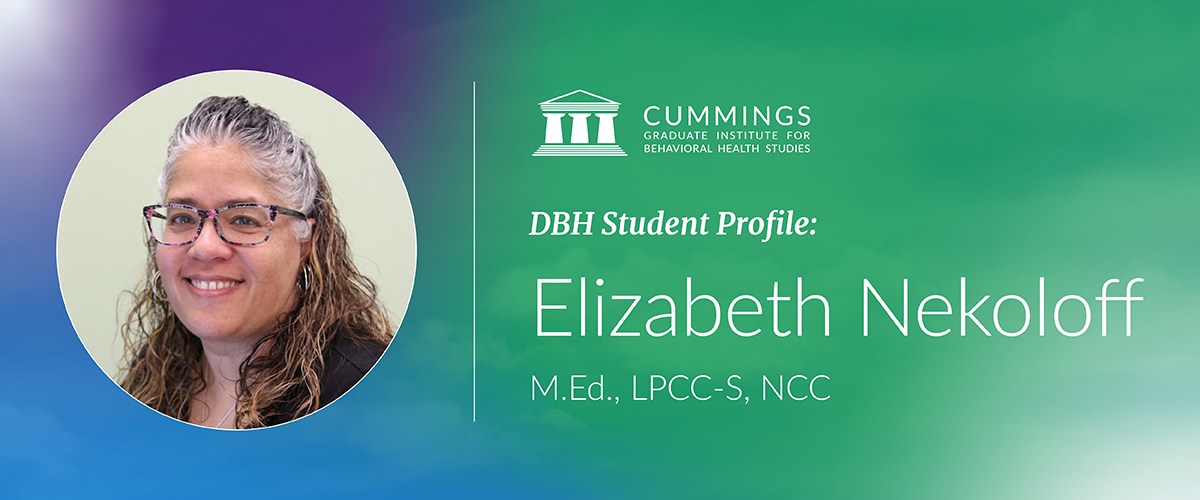 Breaking Stigma and Building Resilience: Elizabeth Nekoloff’s Journey of Advocacy and Integrated Care
Breaking Stigma and Building Resilience: Elizabeth Nekoloff’s Journey of Advocacy and Integrated Care
Jan. 16, 2025
Elizabeth Nekoloff, a Doctor of Behavioral Health (DBH) student at Cummings Graduate Institute for Behavioral Health Studies, graduated from Ursuline College in 1992 with a degree in Psychology, marking the beginning of her meaningful career in social services. Her professional journey began as a childcare worker in a group home before transitioning to a 28-year tenure with the Cuyahoga County Division of Children and Family Services. In 2022, she embraced a new opportunity as a Counselor with MetroHealth’s School Health program, providing integrated care to students in two local school districts. Since 2016, she has also been active in private practice. Born and raised in Cleveland, Ohio, alongside three siblings, Elizabeth credits her mother, a teen mom who instilled a strong work ethic, for shaping her resilience and determination. Married for 30 years, she is the proud mother of two adult sons, a daughter-in-law, a dog named Rico, and a granddog named Brutus. Committed to expanding her knowledge in behavioral health and how it relates to physical health, she enrolled in the Doctor of Behavioral Health program in 2023 at Cummings Graduate Institute. In this interview, Elizabeth discusses pivotal moments in her career, outlines her professional goals, and shares what drew her to the DBH program.
What inspired you to pursue the DBH program?
I have always wanted to pursue a higher degree but never found a program that met my needs. When I investigated the DBH program, I can honestly say I was excited. It was a program that would expand my knowledge in behavioral health but also how it relates to physical health. The philosophy of treating the whole person was exactly what I was looking for.
How are you actively contributing to or impacting your local community through your behavioral health expertise?
I currently work for MetroHealth in the School Health Program. This program provides both medical and behavioral health services to 2 local school districts. I work alongside medical professionals to provide for both the physical and mental health wellbeing of the students. I provide brief focused assessments and consultation to students that may be struggling with depression, anxiety, suicidality and/or other everyday struggles.
What aspect of your professional experience has influenced your approach to behavioral health?
I worked in child welfare for 28 years and it has shaped the person I am today. I watched families struggle through some of the hardest things imaginable. Through their hardwork and perseverance they were able to overcome many obstacles. I also witnessed children not being able to go back home to their families. Most of the families I encountered were unable to advocate for themselves. This experience taught me that it is important to teach others to advocate for themselves. This is so important for individuals struggling with behavioral health issues.
What challenges have you encountered in the behavioral health field, and how do you envision overcoming similar challenges in the future?
The stigma that comes with behavioral/mental health and getting services to address them. I actually think the pandemic helped with this stigma, as I have found so many students that are willing to talk about what they have going on. I will continue to educate anyone that will listen.
Can you highlight a situation that has significantly influenced your understanding of integrated care and behavioral health?
Prior to 2022, integrated care was a foreign concept to me. When I accepted my current position and started working in an integrated care setting and realized that the medical staff was interested in treating the whole person. I was amazed. The medical team I work with is interested in what I have to say and value my opinion. The students also appreciate that we are treating them together and advocating for them to get their needs met.
How do you see yourself making a lasting impact in behavioral health?
I plan to continue to educate myself in many different aspects that would provide the best for those I come in contact with. The information that I have learned in the DBH program has opened me up to a whole new world on how I can advocate and teach others to do the same. I think it is important to not only be educated but to also be real with those I am working with. I have found that those I work with truly appreciate that about my style.
How has the DBH program impacted your skills, knowledge, and career trajectory?
I currently work for a School Health program that provides integrated care to students. The knowledge I have gained thus far has come in handy when meeting with students, parents and medical professionals. I am able to understand medical terms that I didn’t previously know, and it has helped my clients. I also work in a private practice and share information with my clients about things I have learned and how they can advocate for themselves.
Elizabeth’s career and educational pathways are driven by her commitment to serving her community and advancing integrated behavioral healthcare. Her decades of experience in social services, counseling, and child welfare have profoundly shaped her approach to advocacy and care. Through the DBH program, she has expanded her expertise, enhancing her ability to collaborate and empower clients. Looking ahead, Elizabeth envisions using her growing knowledge to make a lasting impact in the behavioral health field, advocating for integrated care and inspiring others to overcome stigma and embrace their own resilience.






























